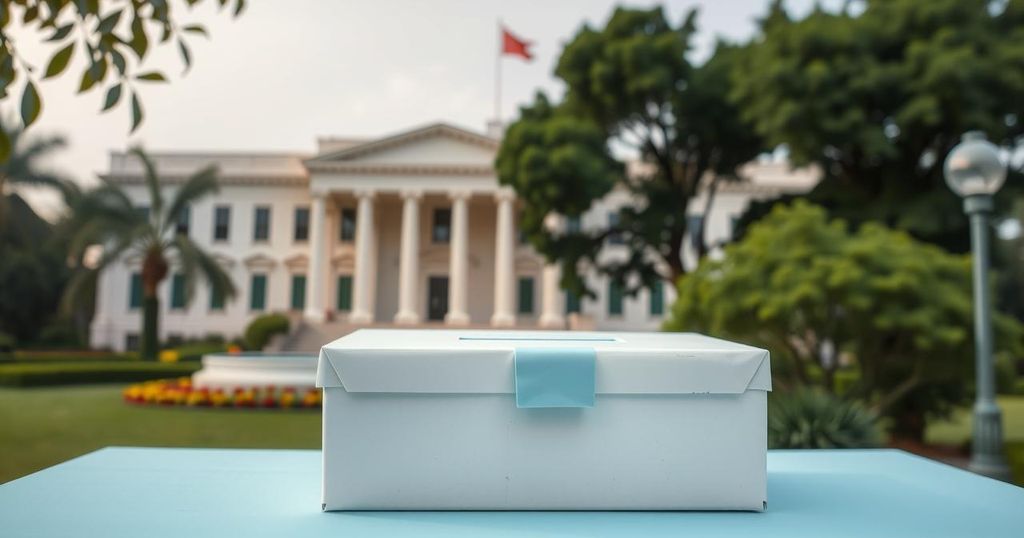Ecuador’s upcoming election occurs amid a severe security crisis, with rising violence and crime shaping voter sentiment. President Noboa’s rigid policies are being scrutinized and compared to alternatives presented by opposition candidates. Citizens are grappling with distrust in government, personal tragedies due to crime, and their economic struggles, making the election outcome crucial for the nation’s future.
Ecuador is currently facing a crucial election amid a severe security crisis, with citizens weighing President Daniel Noboa’s stringent policies against potential new solutions. The tragic loss of individuals, such as Shirley Tobar’s husband, highlights personal impacts of the escalating violence that has permeated society. With crime rates soaring to unprecedented levels, many Ecuadorians feel pressured to vote despite uncertainty about their choices, as the country’s stability continues to crumble under organized crime’s influence.
Once a relatively safe country, Ecuador has seen a sharp rise in violent crime, heavily influenced by drug trafficking and gang warfare, leading to a homicide rate that surged from 6.7 to an estimated 44.5 per 100,000 inhabitants from 2019 to 2023. This crisis has been compounded by political instability, significant corruption linked to drug trafficking networks, and a troubling energy crisis that has caused extensive blackouts and unrest among citizens. As Ecuadorians prepare to vote, they grapple with ongoing fears regarding their safety and trust in the government to address these severe issues.
The election features 16 presidential candidates, with Noboa, who assumed office following the assassination of opposition leader Fernando Villavicencio, seeking continued support. Analysts note that Noboa’s youthful appeal and promises to revive the economy attract many voters, providing an alternative to disillusionment with past political leaders. With areas suffering from gang-related violence, Noboa’s strategy prioritizes military intervention and aggressive law enforcement measures to combat crime.
Despite some reported decreases in homicide rates, many families still feel injustice, while the media frequently highlights extrajudicial killings. Candidates like Luisa González criticize Noboa’s approach, advocating social investment rather than militarization, proposing comprehensive reforms aimed at rebuilding the justice system and enhancing human rights protections. González, representing the Citizen Revolution Movement, seeks to capture support rooted in nostalgia for the economic stability experienced under Rafael Correa, despite his controversial legacy.
Ecuador’s worsening energy crisis further complicates the electoral landscape, as rolling blackouts severely impact economic activity, prompting critiques of Noboa’s management. He has pledged to enhance energy infrastructure, while González accuses him of mismanagement that has led to economic strife. Voter support for either Noboa or González illustrates the electorate’s desire for solutions amidst escalating unrest.
As political fractures persist, many Ecuadorians continue to experience voter apathy, feeling caught in a cycle of disillusionment with successive administrations that have failed to fulfill their promises. Ultimately, the looming election presents an opportunity for leaders to restore faith in governance while addressing the substantial trust deficit that has emerged in Ecuadorian society. The focus on candidates often revolves around personalities rather than substantive policies, reflecting a broader political crisis in the country.
Ecuador is experiencing significant social and political turmoil, characterized by rising violence, organized crime, and governmental instability. As citizens prepare for the upcoming election, pressing security and economic crises have significantly influenced their voting decisions. The present political landscape showcases a desire for change, yet dissatisfaction with current leadership persists, underscoring the complexity of voter sentiment as societal conditions continue to deteriorate.
In summary, Ecuador’s upcoming election is pivotal, dictated by a backdrop of violence and economic adversity. Voters must navigate their options carefully as the country faces increased crime rates and political corruption. While President Noboa advocates for strict security measures, opposition candidates propose alternative approaches aimed at social reform. The outcome of this election will determine the direction Ecuador takes in restoring stability and addressing its multifaceted challenges.
Original Source: foreignpolicy.com






